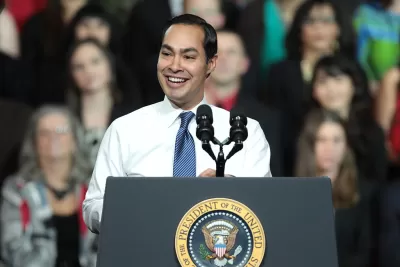"We use housing as a platform to create greater opportunity in people's lives."

On a recent episode of NPR's The Diane Rehm Show, Julian Castro, Secretary of the Department of Housing and Urban Development (HUD) and former mayor of San Antonio, talked about the need for a "holistic" approach to improving outcomes for low-income households. He recalls a woman he spoke with whose elderly mother has diabetes. The doctor prescribed her a daily walk outside. "But her mother couldn't walk around the neighborhood because there weren't any sidewalks, and there were loose dogs. That was the first time as a young policymaker I thought, wow - how connected all these things are."
He addresses the stigma surrounding Housing Choice vouchers, which represent the largest component of HUD's $46 billion budget. He points out that the two million low-income families who use vouchers contribute 30 percent of their income to rent, and the remainder is subsidized. "I think there's this image of Section 8 holders that they don't have any skin in the game. They absolutely do." Addressing the perceived inefficiencies of a large government program, he says, "In 1981, we had 16,500 employees. Today, we have about 8,000 employees. We try to ensure that the bureaucratic process is as tight as possible so that more landlords will be willing to work with us."
The Secretary also discusses race and the evolving role of the Federal Housing Agency (FHA), which HUD oversees, in improving access to home ownership for minorities. "There was a time when the FHA was part of the problem. Now it's part of the solution." NIMBY-ism, however, is often still motivated by racial prejudice. While it's common for homeowners to care about what goes on in the neighborhood, he says, "You can clearly see in a decent number of cases that there's something else that's animating it."
He discusses an initiative to increase internet access in public housing. "More than half of low-income families out there do not have access to the internet. Connect Home is a public-private partnership in 28 communities around the U.S. to hook up folks who live in public housing with either free internet, or very very low-cost internet."
But he concedes that affordable housing—not public housing—is the agency's focus. "For somebody earning minimum wage, there isn't a single city where you can afford a two-bedroom apartment for rent, and only a few cities where you can afford a one-bedroom. What are we doing?" For one, he says, the Promise Neighborhood initiative.
"We have moved away from the old model of stacking folks in public housing buildings. Admittedly, we still have a long ways to go."
FULL STORY: A Conversation with Julian Castro, Secretary of the Department of Housing and Urban Development

Planetizen Federal Action Tracker
A weekly monitor of how Trump’s orders and actions are impacting planners and planning in America.

San Francisco's School District Spent $105M To Build Affordable Housing for Teachers — And That's Just the Beginning
SFUSD joins a growing list of school districts using their land holdings to address housing affordability challenges faced by their own employees.

The Tiny, Adorable $7,000 Car Turning Japan Onto EVs
The single seat Mibot charges from a regular plug as quickly as an iPad, and is about half the price of an average EV.

Seattle's Plan for Adopting Driverless Cars
Equity, safety, accessibility and affordability are front of mind as the city prepares for robotaxis and other autonomous vehicles.

As Trump Phases Out FEMA, Is It Time to Flee the Floodplains?
With less federal funding available for disaster relief efforts, the need to relocate at-risk communities is more urgent than ever.

With Protected Lanes, 460% More People Commute by Bike
For those needing more ammo, more data proving what we already knew is here.
Urban Design for Planners 1: Software Tools
This six-course series explores essential urban design concepts using open source software and equips planners with the tools they need to participate fully in the urban design process.
Planning for Universal Design
Learn the tools for implementing Universal Design in planning regulations.
Smith Gee Studio
City of Charlotte
City of Camden Redevelopment Agency
City of Astoria
Transportation Research & Education Center (TREC) at Portland State University
US High Speed Rail Association
City of Camden Redevelopment Agency
Municipality of Princeton (NJ)





























